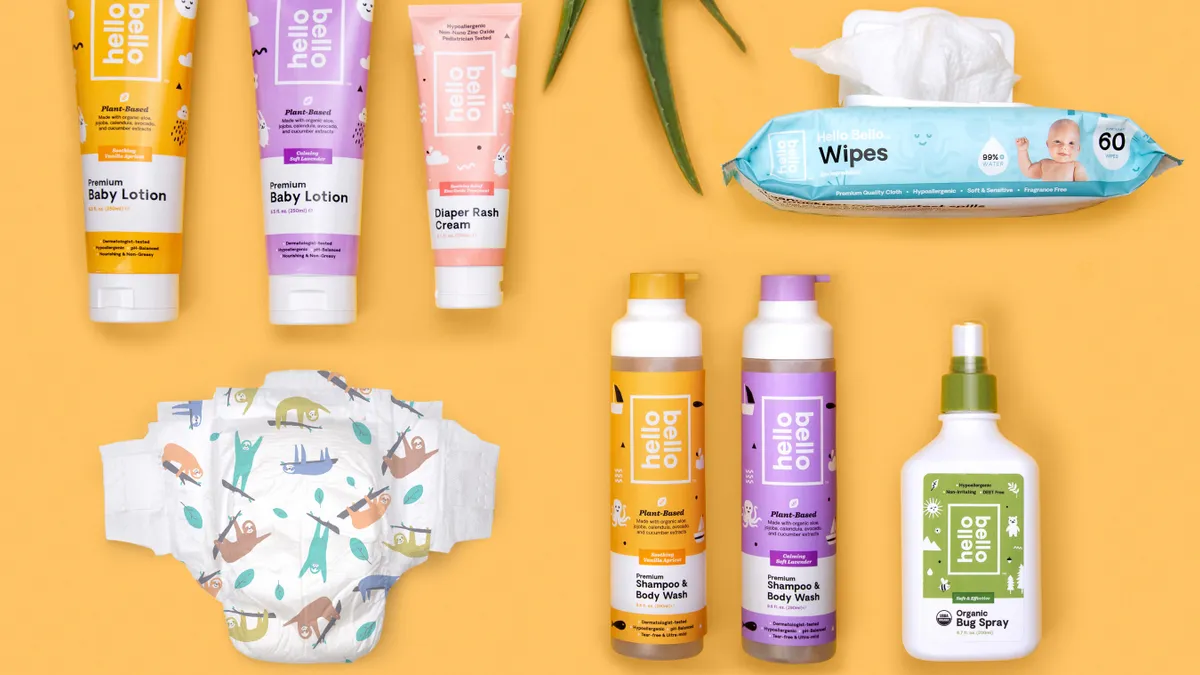Dive Brief:
- Unconditional Love Inc. — which does business as Hello Bello — filed for Chapter 11 bankruptcy in order to facilitate being acquired by private equity firm Hildred Capital Management, according to a Monday press release. The stalking horse bid deal — valued at about $65 million, according to court documents filed Monday — is expected to conclude within the next few months and is subject to higher or better offers.
- Hello Bello — founded by actors Kristen Bell and Dax Shepard — expects to fund its business operations throughout the process via debtor-in-possession financing. The baby care brand in its bankruptcy petition listed assets and liabilities of at least $100 million each. For the fiscal year ending Jan. 31, 2023, Hello Bello generated about $179 million in sales and had negative EBITDA of about $15 million.
- CEO Erica Buxton said in court documents that Hello Bello experienced the negative impacts of higher shipping costs, increased purchase prices and delayed raw materials shipments from the COVID-19 pandemic. The brand’s effort to control these issues by opening its own manufacturing facility did not yield positive results fast enough.
Dive Insight:
Though it once boasted the title of the leading direct-to-consumer subscription diaper brand in the U.S., Hello Bello has moved into bankruptcy as a result of supply chain issues.
"Given macroeconomic trends, including inflation and increased shipping costs, we believe that this course of action is the best path forward to ensure that Hello Bello continues to bring families the highest quality and most environmentally friendly products at affordable prices," Buxton said in a statement.
The brand initially launched in 2019, selling through its own direct-to-consumer channels and with Walmart. For the period ending Jan. 31, 2023, retailer sales comprised about 60% of Hello Bello’s total annual sales, while its e-commerce DTC business generated roughly 40% of sales. Diapers and training pants accounted for about 67% of the brand’s revenue in fiscal year 2022.
During the onset of the COVID-19 pandemic, the brand experienced success as it was already well-positioned with a strong online subscription service. However, it initially relied on one third-party manufacturer, Irving, which began to increase rates in 2021 beyond what the brand could afford.
“For example, over time, the manufacturer increased diaper production prices by over 18%; however, [Hello Bello’s] main wholesale retailers, such as Walmart and Amazon, would not accept a price increase of more than 10%,” Buxton said in court documents.
As such, Hello Bello decided to open its own manufacturing facility in Texas. However, the company did not see the benefits of this decision until recently because of issues related to getting the facility up and running. Hello Bello was still purchasing from Irving as it got the new facility operating, which required the baby care brand to pre-purchase inventory for up to one year in advance.
“[Hello Bello] was left with front-loading the costs of producing warehouses full of excess inventory without reaping the benefits of the anticipated, high volume product sales,” Buxton added.
The brand experienced delays getting its production lines operational as COVID-19 restrictions prevented employees from being able to travel to oversee the process and approval processes took significant time. The first production line was delivered to Texas in the summer of 2021, but was not assembled and approved until six months later.
Hello Bello had difficulty staffing the facility as well, as the area is a competitive space and the brand was not able to offer consistent hours initially, which led to high turnover. The company has only recently begun to realize some benefits from opening its own facility and estimates the savings to be about five cents per diaper. Buxton said the brand has the ability to create a 25% reduction in manufacturing costs at maximum capacity with total cash savings of up to $54 million.
Leading up to its bankruptcy, Hello Bello enacted several cost-saving efforts that included scaling back its international footprint, requiring more DTC customers to pay for shipping, reducing its corporate workforce by 20% and more.
The baby care company's DIP financing is a revolving credit facility of about $47 million, which includes up to $12 million in new money commitments, with about $5.5 million of that available in the interim period.
















